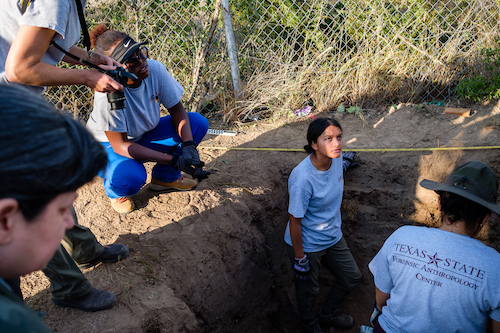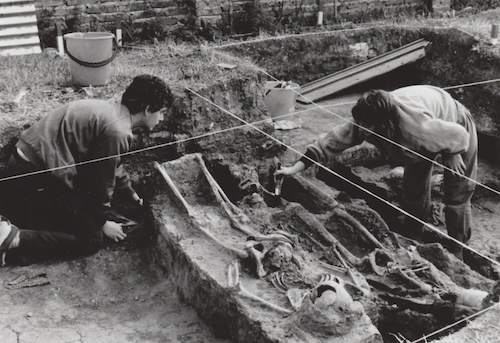Communiqué
A U.S. anthropologist trains Latin American students in the use of forensic anthropology on INDEPENDENT LENS: “El Equipo” – Oct. 9 at 10 pm
< < Back to a-u-s-anthropologist-trains-latin-american-students-in-the-use-of-forensic-anthropology-on-independent-lens-el-equipo-oct-9-at-10-pmNEW DOCUMENTARY
“EL EQUIPO”
CENTERS THE NOBEL PEACE PRIZE- NOMINATED TEAM THAT CHANGED THE COURSE OF FORENSIC SCIENCE, UPHOLDING INTERNATIONAL HUMAN RIGHTS AFTER ARGENTINA’S 1976 DICTATORSHIP AND BEYOND
PREMIERING ON PBS’S INDEPENDENT LENS OCTOBER 9, 2023
Emmy Award-Nominated Filmmaker Bernardo Ruiz Traces the Team’s Unlikely Journey Over Four Decades, Trained by Legendary Anthropologist Dr. Clyde Snow, As They Bring International Governments to Justice
In 1984, legendary U.S. anthropologist Dr. Clyde Snow got a call to go to Argentina and investigate “los desaparecidos,”—or “the disappeared”—the term given to those who went missing under the country’s military dictatorship from 1976 to 1983. Armed with a young group of Latin American students, his team’s stunning findings would soon set off reactions internationally, making them a beacon of hope for families of human rights victims around the globe.
Directed by Emmy® Award-nominated filmmaker Bernardo Ruiz (“The Infinite Race,” “Kingdom of Shadows”), “El Equipo” premieres October 9, 2023, at 10:00 p.m. as part INDEPENDENT LENS, on PBS and the PBS App.

This INDEPENDENT LENS and VOCES co-presentation unearths the life’s work of Dr. Snow, an esteemed anthropologist from Texas known for his work identifying the remains of Auschwitz physician Josef Mengele and victims of serial killer John Wayne Gacy. Dr Snow traveled to Argentina to uncover the fates of the estimated 30,000 people who were victims of enforced disappearance during the country’s 1970s military dictatorship. Unwilling to work with many of the established scientists who had collaborated with the military dictatorship, Snow set about training a group of students—some as young as 19 years old—in the use of forensic anthropology to investigate the fate of those missing, provide answers to thousands of families, and hold the government accountable for the crimes committed.
Dr. Snow’s team became a target only a year after the fall of Argentina’s military regime, receiving death threats and intimidation for their investigation of the country’s atrocities. Still, the group, which included Mercedes (Mimi) Doretti, Patricia Bernardi, and Luis Fondebrider, would go on to help establish accountability for the crimes committed under the Argentine military junta.
With unprecedented access to the Argentine Forensic Anthropology Team and its archives, “El Equipo” spotlights systemic political and human rights abuses and deftly creates a direct link between state atrocities from the past and present. The documentary delves into some of the most high-profile cases of the team’s history, including the El Mozote massacre in El Salvador, and the later case of the missing 43 students in Mexico, where upon investigation, members of the forensic team have faced threats, surveillance, and official attempts to discredit their work. Dr. Snow’s legacy is also examined in countries like Guatemala, where he mentored forensic scientist Fredy Peccerelli and helped create a Guatemalan forensic team.

“Dr. Clyde Snow was a shrewd forensic investigator and understood that the public tends to lavish coverage on ‘lone wolf’ serial killers,” said Ruiz. “Famously he said, ‘It’s too bad Jeffrey Dahmer didn’t come to Guatemala ’cause he’d be a general by now.’ In ‘El Equipo’ we use the grammar of the true crime serial in order to delve into a real-life drama spanning four decades, about the unlikely partnership between Snow, a larger-than-life Texan, and a group of Latin American and Central American students who would go on to change the course of forensic science and human rights.”
“We’re proud to be part of the ‘El Equipo’ team, our sixth film with director Bernardo Ruiz,” said Sandie Viquez Pedlow, executive director of Latino
Public Broadcasting. “Like the best of Bernardo’s work, this film has a quiet, haunting power that stays with you long after the lights come up. It’s a fascinating yet heartbreaking story, beautifully told.”
“El Equipo” was awarded the Jury Prize for best documentary feature at the 2023 Sebastopol Documentary Film Festival, and was named a “Top 20 Audience Favorite” at the Hot Docs Canadian International Film Festival. The film was produced in partnership with VOCES and Latino Public Broadcasting, and received funding through ITVS’s Open Call funding initiative.
Visit the “El Equipo” page on INDEPENDENT LENS for more information about the film.

